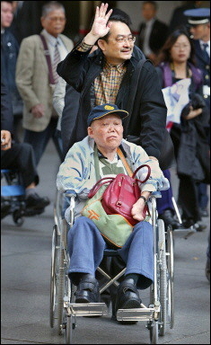|
Former Taiwanese leprosy patients win case against Japan
(AFP)
Updated: 2005-10-25 16:12
Former leprosy patients in Taiwan who were forcibly isolated under Japanese
colonial rule won a legal victory as a Tokyo court ordered the state to pay
compensation, but South Korean plaintiffs lost a similar suit.
Judge Hiroyuki Kanno at the Tokyo District Court said the 25 claimants were
entitled to damages under a 2001 law compensating thousands of leprosy patients
in Japan who suffered decades of systematic abuse by the state.
But in a separate court ruling, former South Korean leprosy patients lost
their claim for compensation as a second judge reached a different legal
conclusion as to whether the law applies to overseas patients.
The contrasting rulings were the first-ever verdicts on the Tokyo
government's isolation of leprosy patients outside of Japan.
Huang Chin-liang, a 76-year-old Taiwanese plaintiff who was sent to a
segregation facility at age 14, told reporters she was only "half-joyful",
expressing sympathy for her dejected South Korean comrades.

Taiwanese plaintff Wang Jiang-He, 79, (front)
and a supporter leave the Tokyo District Court.
[AFP/file] | "I'm speechless with sorrow," said South Korean plaintiff Chang Gi-Chin, who
was forcibly sterilised after he refused to pay homage to a Shinto shrine built
in the sanatorium because he is a Christian.
"I can't understand the discriminatory ruling which makes a group of
sufferers go home with a smile and the other with tears," the wheelchair-bound
84-year-old said as he wiped away tears.
The defense counsel involved in the Taiwanese and South Korean lawsuits said
they hoped to find a swift solution in both cases, as the average age of the
plaintiffs is already over 81.
"It cannot be forgiven to prolong the settlement because of the divided legal
judgments," chief lawyer Naoko Kunimune told a news conference. The defence team
will urge the health ministry not to appeal the Taiwanese case.
Kunimune vowed to appeal the ruling in the South Korean case, which she
criticised for "sticking to legal details and failing to look at the whole
picture".
The two judges arrived at different interpretations of whether the law
applies to facilities located overseas -- a point that is not explicitly defined
in the text.
Judge Toshihiko Tsuruoka at the Tokyo District Court rejected the argument by
the 117 South Korean plaintiffs, who were put in enforced isolation during
Japan's 1910-45 occupation of the Korean peninsula, that an earlier compensation
deal should also apply outside Japan.
He said there was no evidence that Japan's governing parties took patients in
sanatoriums overseas into consideration when they drew up the 2001 law.
But Judge Kanno, ruling in the Taiwanese case, said: "It would be
inappropriate in terms of legal equality to exclude inmates from compensation
only because their facility was in Taiwan."
Japan's 1907 legislation provided for patients to be forcibly isolated as a
national policy. This continued long after it was established that leprosy could
not be contracted simply by touching someone with the disease.
In 2001 the Japanese parliament approved a compensation bill worth up to 14
million yen (122,000 dollars) for each of hundreds of leprosy patients in Japan
who suffered decades of systematic abuse by the state.
In December 2003, South Korean former patients from a hospital on Sorokto
island off the Korean Peninsula asked Japan's health ministry to compensate them
in line with the 2001 law. Their request was rejected in 2004.
The Sorokto hospital opened in 1916 and at one point held more than 6,000
patients. Some 700 people -- including the plaintiffs -- still live at the
facility, according to lawyers supporting them.
|